Q. Where can I find information about Richland Soil and Water Conservation District Events?
Q. What soil and water information can Richland SWCD provide?
A. Drainage and erosion, flooding, pond creation and maintenance, forestry management, agricultural programs, Aerial-GPS maps, soil testing, native plants, and stormwater management practices
Q. I installed drainage tile a number of years ago and I think it’s broken in places. How can I fix it?
A. If you discovered clay tile that is separated or broken, it may be time to replace the entire system with plastic tile. If the clay tile is operating well, you can join the clay tile with plastic for repair. If the tile is plastic and became crushed by heavy equipment, simply remove the crushed section and repair with similar-sized plastic tile. If tree roots are a problem, have an experienced contract hydro-jet or grind the roots. After cleaning, repair the damaged sections.
Q. How do I properly manage storm water?
A. You want to reduce the total volume of the water discharge and the best thing you can do is attempt to slow water down before it leaves your property. This can be done numerous ways. First of all, you should try to outlet your downspouts on the ground surface, as far from property lines as possible. This gives your water an opportunity to soak into the soil before it becomes runoff. Secondly, you can install some type of retention practice such as: rain barrels, a gravel pit/French drain, retention pond or rain gardens.
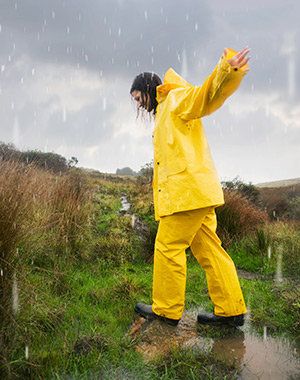
Q. After each rain, I am left with a large area of standing water in my yard. What can I do?
A. If the standing water lasts only a few days, nature has taken care of it and nothing needs to be done. If the standing water has developed in recent years and lasts for more than a few days, check the area for a failing subsurface tile drain. If the standing water has always occurred, you can enhance the area with moisture tolerant plants and create a wetland or garden.
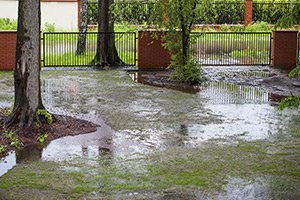
Q. We just bought a house that came with a pond. Unfortunately, it’s really overgrown. What can I do to get it cleaned up?
A. You need to determine the primary reason for owning a pond or lake. Is it for adding landscape amenities or for recreation? Each reason is managed differently and we should remember that Mother Nature, by her own rules, fills all landscape depressions in time. If your pond or lake is old it may be time to drain it and removed decades of silt and organics. Other options are to use chemicals or to physically remove vegetation.

Q. I’m putting up a storage shed. Do I need to get a storm water permit?
A. If your property is within Richland County and not in the incorporated limits of a city or village (Lexington is the exception), you will need to fill out a Stormwater Permit Application. The details of your project (amount of disturbed soil & amount of impervious area to be developed) will determine whether a permit, fee exemption or permit exemption is required. The purpose of the permit program is to save soil from eroding and to manage runoff from project sites. The Storm Water permit office is open Monday, Wednesday and Thursday from 8:00 a.m. to 12:00 noon. If you’re working on a commercial project, please call to schedule an appointment.
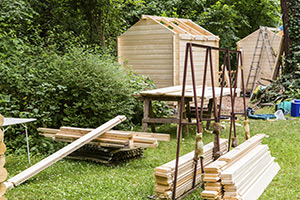
Q. Whenever it rains, water from my neighbor’s property comes onto my property and now my basement floods whenever it rains. What can I do to make our neighbor correct the problem?
A. The best course of action is for you to contact your neighbor with your concerns and attempt to cooperate with each other to come up with a mutually agreeable solution. If this cannot be achieved, invite us out to provide recommendations for both properties.
Q. One side of our property is bounded by a ditch and over the years, the banked area has continued to erode. What can we do to keep it from eroding any further?
A. First, determine if the ditch is a township ditch, county ditch, or state highway ditch. These types of ditches are on a maintenance schedule of the proper sector. Simply call them and ask to report a problem. If this is a private ditch and it’s agricultural, agricultural operators are exempt from local regulations. If this ditch is strictly on your property, you may need a permit to manage the erosion of the freshly repaired banks. If you happen to have a stream or river on your property, contact us because there may be state and federal permits needed to alter the water course.
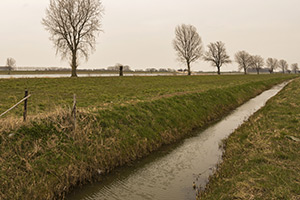
Q. What is the best compost?
A. Compost is broken into two classifications. One is fresh vegetation that breaks down into nutrient-rich humus. The other is woody vegetation that breaks down providing soil with texture, tilth and moisture holding abilities. Both are needed to provide the proper balance of organisms to sustain life.
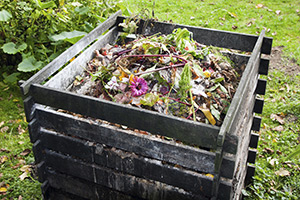
Q. I want to have my soil tested. Can you help me?
A. You have two options. We can either pull a sample for you or you can pull the sample and bring it into the office. Once the sample is obtained, we’ll send it in to be tested. The results of the test will be analyzed and recommendations provided.
Still have a question?
If you have a question that has not been answered on this page, or you need more information, let us know. We’re here to help.